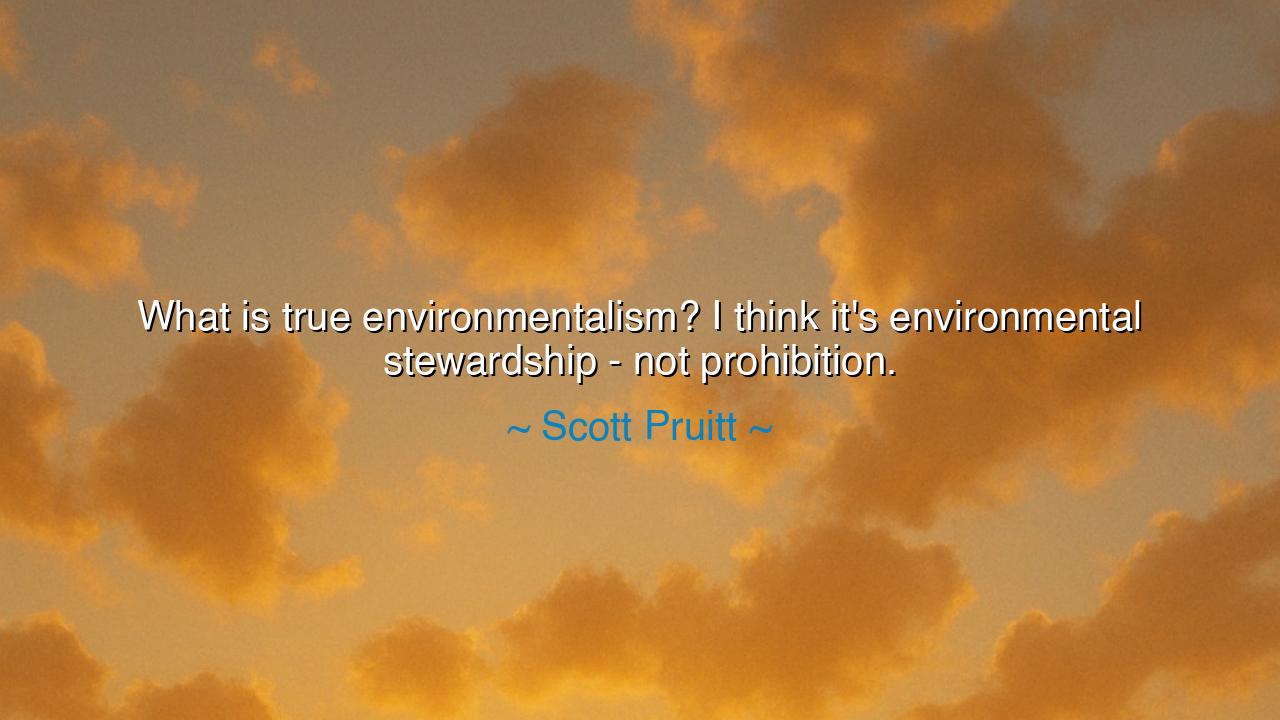
What is true environmentalism? I think it's environmental
What is true environmentalism? I think it's environmental stewardship - not prohibition.






Hear the words of Scott Pruitt, spoken with conviction in the midst of the age-old debate between preservation and use: “What is true environmentalism? I think it’s environmental stewardship—not prohibition.” These words are not idle musings, but a definition of a path: one that does not seal the earth away as forbidden, nor strip it bare with greed, but tends it as a shepherd tends his flock. They are words forged in the tension between those who say “do nothing” and those who say “take all.” Pruitt instead calls for balance—a vision of man as guardian, not outlaw.
The meaning of this quote lies in the word stewardship. A steward is not the owner, yet neither is he absent. He is entrusted with care. To Pruitt, this is the essence of true environmentalism—that humanity has been given dominion over forests, waters, and skies, but also the sacred duty to manage them wisely. Prohibition, by contrast, is the idea of barring all use, of locking away the gifts of the earth as though they were dangerous to touch. To him, this is not balance, but paralysis, and it ignores the truth that people live from the land even as they protect it.
The origin of these words emerges from the fierce debates over American energy, conservation, and regulation. As Administrator of the EPA, Pruitt often spoke against policies he viewed as heavy-handed, those that banned industries outright or placed vast lands beyond human reach. His vision was not of unregulated exploitation, but of responsible use, where energy, agriculture, and development could coexist with conservation. His words echo an older argument in environmental thought: whether man is an intruder in nature, or a caretaker placed within it.
History offers us mirrors. Consider the people of the Nile in ancient Egypt. They did not prohibit the river, nor exploit it beyond repair. Instead, they studied its floods, built canals to guide its waters, and tilled the soil in harmony with its rhythms. This was stewardship—use joined with reverence. Contrast this with the collapse of Easter Island, where forests were felled until none remained, leaving the people desolate. There was no stewardship there, only greed, and the land itself turned against them. These two tales illustrate Pruitt’s truth: prohibition starves, exploitation destroys, but stewardship sustains.
The lesson is clear: the earth is not an enemy to be subdued, nor a treasure locked away from all use. It is a trust, placed in human hands with expectation of care. True environmentalism does not demand that we forbid ourselves from touching the earth’s resources, but that we touch them with wisdom. It calls for farming that renews soil, forestry that replants what it cuts, energy that harnesses without exhausting, and cities that build without suffocating. In all things, it demands balance.
What then must we do? As citizens, we must embrace the role of stewards. Reject both extremes—the reckless exploitation that scars mountains and poisons rivers, and the blind prohibition that declares all human use a crime. Instead, learn to manage the gifts of earth with gratitude and foresight. Support leaders and laws that encourage sustainability, not waste; innovation, not paralysis. And in our daily lives, live lightly: consume with care, conserve where possible, and leave behind not scars, but seeds.
Thus, remember Scott Pruitt’s words: “True environmentalism is stewardship, not prohibition.” Pass this wisdom to your children, that they may inherit not a wasteland nor a locked vault, but a flourishing garden. Teach them that their hands are not meant to plunder, nor to recoil in fear, but to cultivate. For in stewardship lies the secret of endurance: the ability of mankind to dwell upon the earth not as destroyers, not as prisoners, but as faithful guardians of creation.






AAdministratorAdministrator
Welcome, honored guests. Please leave a comment, we will respond soon